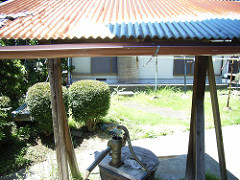Translated by KATHARINE HALLS
We never had carts, only donkeys that trotted along unencumbered. But my imagination sketched a cart onto every donkey I saw.
I learned to pray facing a well. My grandfather would stand behind me, reciting the words I was to memorize, and scraping at the ground with a stick that was always ready to leap onto my back at the slightest slip. I would repeat his words without mistake.
When I had memorized my prayers, Grandfather gave me a donkey. He then sent me to a man in Souq al-Surour to buy palm-frond saddlebags for my donkey’s back. The market stalls were inside adobe rooms and in the shade under trees. In one room, with a door and a small high window, a man was selling palm-frond mats and the sarongs grown-up men wear underneath their clothes. I wasn’t old enough to wear one yet, so my little bits dangled freely and could sometimes—especially if my clothes got wet—be glimpsed, like those of my little naked donkey, which was really only a foal. I was too young for people to care what I was hiding or what I was thinking. The shopkeeper held up two ready-made saddlebags and lifted them onto the donkey’s back, where they looked like palm-frond wings. He knew why I’d come and didn’t ask for any money. He just asked me to send his regards to my grandfather. The grown-ups always knew who we were, seeming to silently read the traces of our parents and grandparents in our faces.
I set off barefoot one morning soon after, patting my donkey’s back with a small whip. Grandfather had asked me to go to three houses after dawn prayers each day. My father had died in Bahrain—he went there to work, and never came back. My mother told me that God had chosen him to be with the angels in heaven, and that in heaven there were donkey-drawn carts like the ones in Zanzibar. My mother had never been to Zanzibar, but Grandfather, who’d been on many trading trips there, had told her there wasn’t a single donkey on the island that didn’t pull a cart.
The first house belonged to an alfalfa farmer. A young girl would wait for me, holding a sheaf of alfalfa, which I put into one of the saddlebags. The girl wore a hat pulled down over her ears against the morning cold. She had big dark eyes and her forehead was painted with yellow pigment. She never smiled or talked. She just looked into our faces, mine and my donkey’s.
The second house was where I dropped off the alfalfa. The owner would give me a cup of milk to drink, then take the alfalfa and say, Regards to your grandfather.
In the third house a blind woman lived alone, raising chickens. I’d kiss the top of her head so she’d know it was me, while the chickens pecked around our feet. Grandfather always put a bag of seeds in the saddlebag for me to give to the blind woman. She’d hand me a basket of eggs and say, Regards to your grandfather. Then she’d give me two figs, which I’d eat on the way home.
Donkeys ambled across my path from time to time. I imagined a cart for each one, like those my father saw in heaven and my grandfather had seen in Zanzibar.
Mahmoud Al-Rahabi is a short story writer and a novelist from Oman. He is the author of five short story collections and three novels. He has received the Sultan Qaboos Award for Literature and the Dubai Literary Award, among others.
Katharine Halls‘s co-translation of Raja Alem’s The Dove’s Necklace will be published in 2016. Her film translations include the prizewinning Out on the Street and Common State, potential conversation[1], and her stage translations have been performed in Europe and the Middle East.
[Purchase your copy of Issue 11 here.]
[Read more Arabic fiction in Issue 15.]




